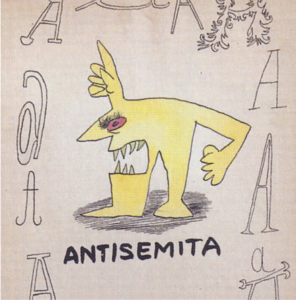One preconception, many shades
 “In the popular opinion antisemitism is increasing. However, the word “Antisemitism” has a very broad meaning and could vary from the expression of prejudices, stereotypes and opinions to concrete actions however serious they might be. It could concern the idea of Jewish, the Jews, the imaginary Jew or Israel, the ‘Zionists’ and so on. It often involves people that are not Jewish, as well. It can be expressed in public or private speech, it can happen online or offline, the event itself could be seen from the point of view of the target (the Jews), from the point of view of the community, of the public opinion or more”.
“In the popular opinion antisemitism is increasing. However, the word “Antisemitism” has a very broad meaning and could vary from the expression of prejudices, stereotypes and opinions to concrete actions however serious they might be. It could concern the idea of Jewish, the Jews, the imaginary Jew or Israel, the ‘Zionists’ and so on. It often involves people that are not Jewish, as well. It can be expressed in public or private speech, it can happen online or offline, the event itself could be seen from the point of view of the target (the Jews), from the point of view of the community, of the public opinion or more”.
This is the introduction of the last survey started by the Anti-Semitic Observatory of the CDEC (Contemporary Jewish Documentation Center), in Milan, of which the sociologist Betti Guetta is supervisor. It is based around an idea, an ambition: “Gathering information on what reaches the élite, that means which ideas and topics, which opinions on Jews, Judaism and Israel arrive in their professional and social sphere”.
Twenty-two people have been interviewed, among which professors, philosophers, journalists, politicians, psychoanalysts and others. These are the questions they have been asked: “In your opinion, what is antisemitism today and where does it come from? Is it a separated event or does it go with other forms of intolerance? How do you consider the antisemitism in Europe and in Italy? Is it constant or has it changed? Who is the anti-Semite? What role do Israeli policies play? What role does internet play? What are the best means to fight it? What is the role of the political institutions in reporting the danger of this growing phenomenon?
This survey represents the third stage of a process that began in 2007 with a first important research on the most widespread preconceptions, and then a second one 10 years later, in 2017. By comparing the two results, tells Guetta, it is clear that stereotypes of a certain kind are too steady and difficult to tear down, and “the Jews” still represent “power, wealth, cohesiveness, avarice, egoism, conspiracy” in the Italian collective imagination, or at least for a significant number of people.
In general, adds the researcher, there is “lacking knowledge, direct or indirect, on the topic: over half of the people (54.6%) do not know how many Jews there are in Italy but there are many (36%) who overestimate their presence and ‘power’ “.
The last study has changed the point of observation, addressing now to those who “can be considered opinion leaders due to their role and their social status”. Their interviews are with open questions and free answers without any restriction or specific parameter to follow. For some of the interviewees this has been a first-time topic, never faced before, which also gave interesting ideas.
“The first thing we noticed, underlines Guetta, is how they reluctantly speak about Jews, and the reason is the fear of making mistakes, offending, embarrassing. In some cases, a certain hesitation to answer has emerged”. There are different reasons for this, including “the embarrassment of not being sufficiently informed, the fear of making mistakes, of saying something politically incorrect, the concern of being considered anti-Semitic when criticizing the Israeli state”, as the sociologist underlines.
Studies like the one just carried out help to understand, and give a new interpretation to the facts. A new precious means for raising awareness. “Observing means using the keys and a whole toolbox, highlights Guetta, the antisemitism is not a solid reality. Quite the opposite, it is very differentiated and complex. For every emerging matter, a focused intervention is necessary”.
It is a challenge in the everyday activity of the CDEC Foundation and its Anti-Semitic Observatory, that, among other tasks, collects and register anti-Semitic warnings from the entire national territory, processes the data of anti-Semitic episodes, starts qualitative and quantitative surveys on the public opinion, carries out focused studies and monitors in depth the online part. This new study is therefore part of a strategic path of in-depth analysis, elaboration and action.
Above, image from the catalog of the exhibition “Saul Steinberg Milano New York” curated by Italo Lupi and Marco Belpoliti with Francesca Pellicciari and realized with the Electa publishing house.
Translated by Alice Pugliese and revised by Gianluca Pace, students at the Advanced School for Interpreters and Translators of the University of Trieste, interns at the newspaper office of the Union of the Italian Jewish Communities.
